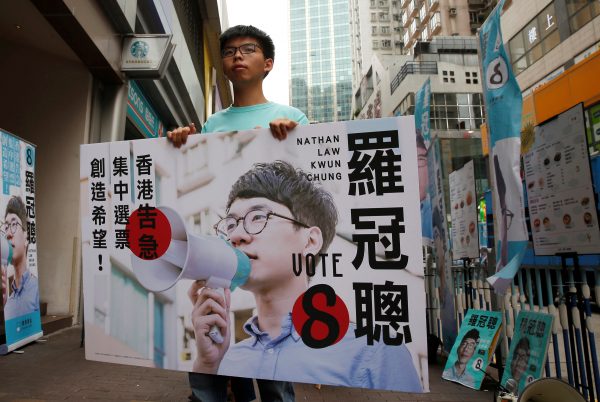by airport authorities in Bangkok, denied entry to Thailand and returned to Hong Kong the next day.
The Thai English newspaper Nation reported that the request came from Beijing and that the military government of Prayuth Chan-ocha was willing to cooperate. The Prayuth administration certainly intended to discourage foreign student activists from engaging in exchanges with local student movement leaders who constitute an important opposition force in Thailand. His administration also values close economic and political ties with China.
The Chinese embassy in Thailand denied knowledge of the incident and Hong Kong’s Justice Secretary Rimsky Yuen Kwok-keung indicated that he did not believe that the Chinese authorities had been involved in the decision to deny Wong entry to Thailand. Hong Kong pro-democracy legislators, in a show of solidarity, publicly protested against Wong’s treatment and demanded pursuit of the case.
Hong Kongers in general believe that Beijing has a blacklist of pro-democracy activists and student movement leaders engaging in publicity activities in foreign countries. Cooperation comes easily from friendly authoritarian regimes in Southeast Asia like Thailand and Malaysia. One of the publishers involved in the notorious Causeway Bookstore case, Swedish citizen Gui Minhai, was abducted from Thailand and brought back to China at the end of 2015. There has been no formal denial of this from Bangkok even after reports by the international media.
In the eyes of Beijing — in line with its policies on Taiwan, Tibet and Xinjiang — advocacy for independence or any related subject matter is a serious taboo. The Chinese authorities are more severe in dealing with student movement leaders than with mainstream pro-democracy activists because the former group is advocating for Hong Kong’s independence or an official referendum on the territory’s future.
In Hong Kong’s September 2016 Legislative Council election, six radical young politicians secured seats and are now a force to be reckoned with. They are expected to grasp every opportunity to articulate their pro-independence platforms in the legislature, posing an embarrassing challenge to the Hong Kong government and the Chinese leadership.
The pro-establishment camp holds 40 out of 70 seats in the legislature and is expected to tighten its control over parliamentary procedures to minimise filibuster. This approach may well provoke a more radical response from the new pro-independence legislators.
Hong Kong’s independence was hardly a political issue before the student sit-in street protests of 2014, but since then it has won popular support among younger generations. Pro-independence candidates won 18 per cent of the popular vote in the recent Legislative Council elections and they easily win in student union elections in the territory’s universities. But pro-independence groups have not yet been able to develop a convincing discourse nor credible action program for the realisation of their political objective.
Hong Kongers do not believe that independence is a realistic political goal. But they strongly resent Beijing’s policy towards Hong Kong, its frequent interferences in the territory’s affairs and its denial of democracy for the people. So a considerable segment of the population is sympathetic to student activists who articulate the cause.
Young people’s dissatisfaction is mainly structural and socio-economic. The effects of globalisation and integration with the mainland Chinese economy on most Hong Kongers has been negative in recent years. Starting salaries for fresh university graduates have remained at around HK$11,000 per month for almost ten years while the gap between the rich and poor has been widening. Unemployment is still low but upward social mobility opportunities are increasingly limited. Young people’s low salaries force most of them to live with their parents and it is almost impossible for them to acquire their own accommodation.
This is the case in most parts of East Asia and the developed world. But the housing situation in Hong Kong is especially acute and cost of living high. The harsh crackdown on student activists, the perceived deterioration in press freedom and interferences in university management by the CY Leung administration all exacerbate young people’s grievances. They do not detect any willingness of the government to listen to them.
Chinese leaders’ approach in dealing with dissent in Hong Kong has toughened in recent years. They tend to believe that the people of Hong Kong have to be taught a lesson, that they should understand and accept their version of the ‘one country, two systems’ model and that they should stop behaving like spoiled children always asking for more. After all, unlike during the 1980s and the 1990s, Hong Kong is now dependent on mainland China and not the other way round.
A survey in mid-2016 reveals that over 40 per cent of the territory’s young people wanted to emigrate if given the opportunity. In these circumstances, the defiant attitude of the younger generations will only worsen and the crackdown will continue.
Joseph Cheng is retired Professor of Political Science at the City University of Hong Kong.


After the change of sovereignty in 1997, people in Hong Kong, especially the young ones, realize that one country two systems no longer works. Their future in Hong Kong will not be the same like their parents’. They want change, even for independence, whether it is politically feasible or not.
It works— just need to acknowledge the “one country” part. By dissing your ancestors, bullying mainland brethren, and cursing your yellow skin will not bring any sympathy.
“After the change of sovereignty in 1997, people in Hong Kong, especially the young ones, realize that one country two systems no longer works. ”
I hope the author can be more specific on exactly what does not work. I often hear the complain that Hong Kong people are not as free as before. As a native born Hong Konger who lives the whole of his adult life in colonial Hong Kong, I couldn’t think of one freedom people in Hong Kong currently can enjoy but couldn’t before the hand over. On the other hand I can think of several freedoms that people in Hong Kong can enjoy now but couldn’t during the colonial period.